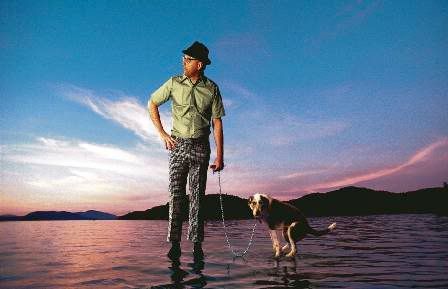Bob Schulz (Stream Team Biologist, Ozark Region) says "Pet waste, especially from dogs, is a significant pollution problem and health problem. Some of the pathogens and parasites in their waste can affect humans, so the disposal method needs to safeguard human health, as well as guard against water pollution."
According to a recent USGS study of streams and creeks in the Kansas City region, bacteria associated with pet waste was the source of approximately one quarter of the bacteria in samples collected from local waterways!
But how does pet waste get into the river in the first place? you ask. Well, lets say you walk your dog and he does his "business" by the curb, that stuff is going to wash right down the gutter, into the storm drain, straight into the James River (or whatever waterway your storm drains empty to. Here in this area, it's the James).

Even if the waste is up in the yard, a good rain can wash it into the storm drain, bit by bit. Multiply this by the number of incidences of dog excrement, then multiply that with the number of dogs in the area, and soon you have a whole lot of untreated fecal waste entering our waterways.
And, as Bob mentioned, there is a lot of badness in pet waste. Bacteria and viruses and parasites. Leave it to wash into the river, and it becomes part of the water. Elevated levels of these things can create an environment unsuitable for recreation.
Here, look at these:
- Salmonellosis: the most common bacterial infection transmitted to humans by other animals. Symptoms include fever, muscle aches, headache, vomiting and diarrhea.
- Toxocariasis: roundworms usually transmitted from dogs to humans, often without noticeable symptoms, but may cause vision loss, a rash, fever or cough.
- Toxoplasmosis: a parasite carried by cats that can cause birth defects if a woman becomes infected during pregnancy, and can also be a problem for people with depressed immune systems.
This just a partial list. The pet waste also feeds the algae, which then absorbs more of the oxygen, choking out the fish and other aquatic animals.
So, to keep it out of the water, dispose of it. Here are some suggestions:
- Scoop it up, seal it in a plastic bag, and toss it in your trash. Admittedly, this is the least green option, but it is convenient and safe for you, and a way to reuse those plastic bags one last time. Be sure to seal the bag shut so your trash collectors are not exposed to the waste.
- Scoop it into a 'flushable' bag, then flush when you get home. Unlike the storm water, the water from your toilet goes to a sewage treatment plant. (NOTE: Biodegradable is not the same as flushable, so check to make sure you have the right kind if you are planning to flush it)
- Create a doggie septic system, if you are feeling really inspired. It isn't as hard as it you might think: http://www.plantea.com/dog-waste-compost.htm
- Bury it. 6-12 inches seems to be the going depth. Much like the doggie septic system, this will allow the natural break down of the waste into the soil, not the storm water runoff, and the harmful bacteria will be neutralized.
When dealing with pet waste, keep in mind that it can be dangerous stuff and act with all due care. Do not bury it near or use it for your vegetable garden. Minimize your contact with the waste. Wash your hands afterwards.
Some people may try to use a traditional composting method for non-food producing gardens, but this can be risky, as these types of compost piles may require more maintenence/more contact, thus increasing your exposure to potential diseases.
Of course, its up to you. Choose the method that works best for you, but please, scoop up that poop.


2 comments:
Congratulations on your new Blog. We have found that the Blog helps communicate to members and non-members alike. Your project is one that we aspire to duplicate. 'Poop' is something that we all have to deal with. The Blog is a great opportunity to clearly illustrate the relationship of cause and affect, i.e. elevated bacterial levels and runoff. Thanks for your nice comments. Please visit us often. In fact, you're invited to join us for our 'trash dump' cleanup.
Nice writing dude...today I gonna share with you about dog poop. We know its a major problem for us to handle dogs waste. Just think about our environment. If you want to keep our environment neat and clean you should use dog poop. I just discover a reliable shop who serves quality things with cheap rate for dog poop. So friends, just follow the link and enjoy...
dog poop
Post a Comment